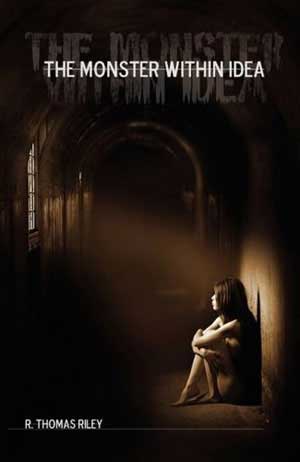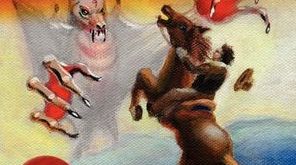 THE MONSTER WITHIN IDEA (PAPERBACK)
THE MONSTER WITHIN IDEA (PAPERBACK)
Author R. Thomas Riley
Published by Apex Publications
Publication Date: 2009
Format: Black /White- 224 pages
Price: $15.95
Death comes in many forms. Sometimes it’s in-your-face, “holy sh*t!” realization. Other times it sidles up to you in red lipstick and a pink thong.”
How’s that sh*t for the start of a story, eh? And that is precisely how R.Thomas Riley kicks the door in on “Just Decoration,” one of the best stories in this collection. Monofilament sharp, witty, it has a marvelously developed sense of irony and cruelty, and he gets it all done in about six pages. That’s how this dude gets it done when he is on his game and that is largely the case with this collection of his short stories.
But… let’s take a step backwards.
From the moment that I saw the title, I was interested here. Simple, yet evocative of an exploration of the beast behind the mask of civilization. Then you add in the stark, haunting cover that seems to suggest that the “monster” within may actually be the innocence that we try so hard to hide away in our quest to appear aloof and unperturbed in this world of horrors and man’s inhumanity to man (that’s right, revel in the cliche). Maybe I’m reading too much into a cover, Nyarlathotep knows I spent too damn much time with my head up my ass getting a degree in English Lit., but that is what I was thinking before I even got a chance to look at the first page.
But you are here to find out if the stories are worth anything, right? After all, you don’t kick out sixteen bucks to look at a cover all day hypothesizing about the contents. At least I hope you don’t. The greedy little collections of words themselves are a bit of a mixed bag, but a satisfying one.
As I said at the start, when this guy is on his game then he comes across as a writer of nearly Braunbeck proportions. In addition to the previously pointed to gem, there are longer stories like “Brittle Bones, Plastic Skin,” an emotionally churning story about loss, sacrifice and the affect they have on a person. “The Day Luffberry Won It All” takes the old Charlie Daniels hit, morphs it around a bit and turns it into something that Serling himself could have written. “Too Little” is everything great flash fiction should be and “Twin Thieves” is a gloriously mean take on groundhog day with a focus on our own selfishness and unwillingness to let go. Riley’s strength lies in his ability to create emotional bonds to his characters and he makes great use of it most of the time.
However, nothing in here matches the eponymous story. Concise, confident and bewildering as all holy f*ck, this is how to do it. A pure experience of paranoia and horror of the truest Lovecraftian sense, this bastard kicked my ass all the way to next Tuesday. Is it simply the story of someone trapped in a closet Author the monster in their room, or have we been placed inside the mind of a hopeless paranoiac? Or is it an analogy for the human condition in an age where we are trained to be constantly afraid of the world around us? In just four pages, he manages to create what Stephen King tried to hard (and ultimately failed) to do with The Colorado Kid, an utterly captivating yet completely unsolvable mystery that doesn’t resort to any cheap cop-outs.
But then there are the flops that are made all the more grating Author these successes. “Jenny” and “the Run” are meh at best, “Tautology” is interesting but forgettable and “Attrition” simply had no place here whatsoever. Then there are the stories that were just plain aggravating, like “In the Beginning” and the worst offender, “Only Spirits Cry.” I don’t need to waste my time reading the beginnings of novels you never managed to finished, especially in the case of the latter story, which stopped right when we were getting to where the real action should be starting. That’s just being a c**k tease and my mind doesn’t need any more blue balls.
Fumbles aside, this is a solid collection from a guy with some serious potential that is certainly worth the cost. My only recommendation (because all writers pay studious attention to critics who find the need to hide behind pseudonyms) would be to be as tight when editing out stories as you are within the stories themselves and don’t ever start with what feels like the most pointless tale of the bunch again.
Available from Apex Publications
Also available from www.amazon.com
 Horror News | HNN Official Site | Horror Movies,Trailers, Reviews
Horror News | HNN Official Site | Horror Movies,Trailers, Reviews
